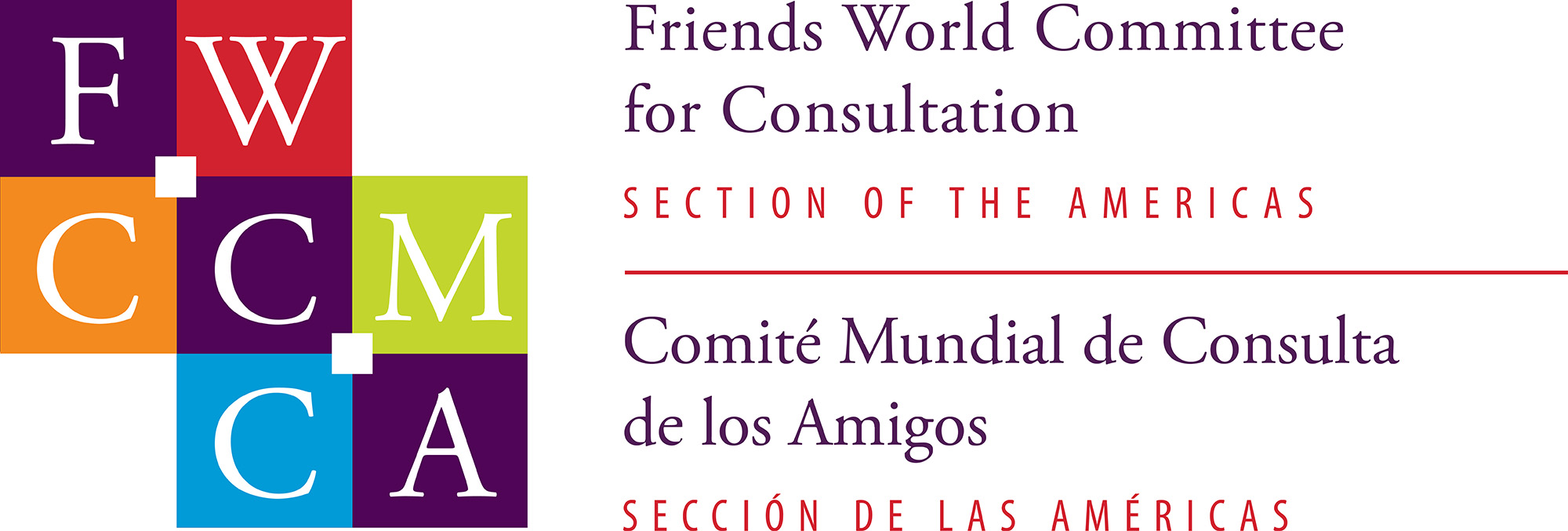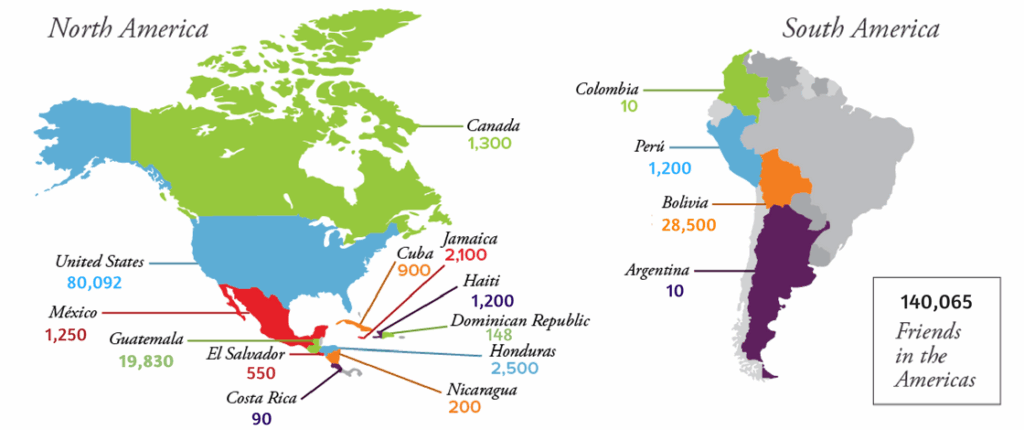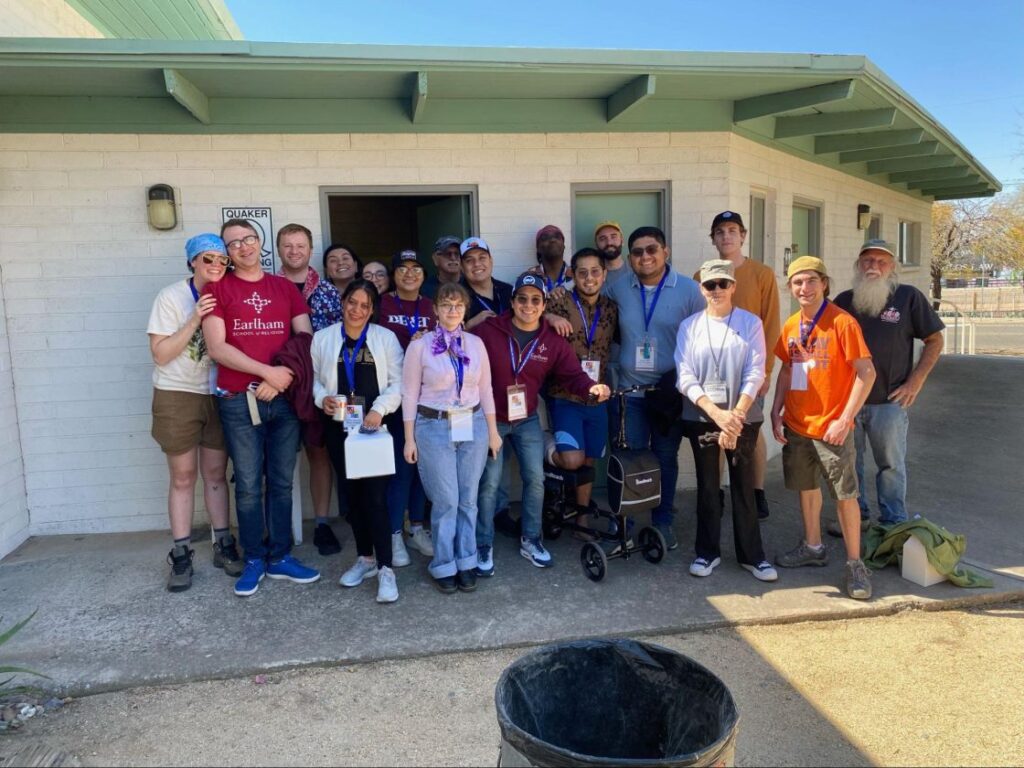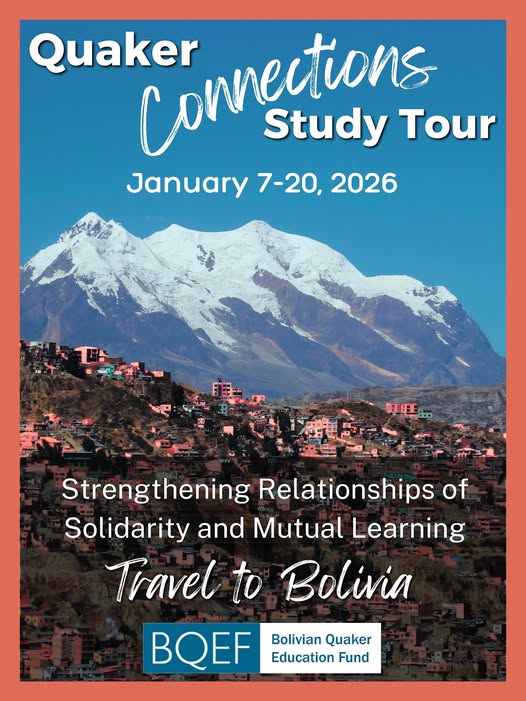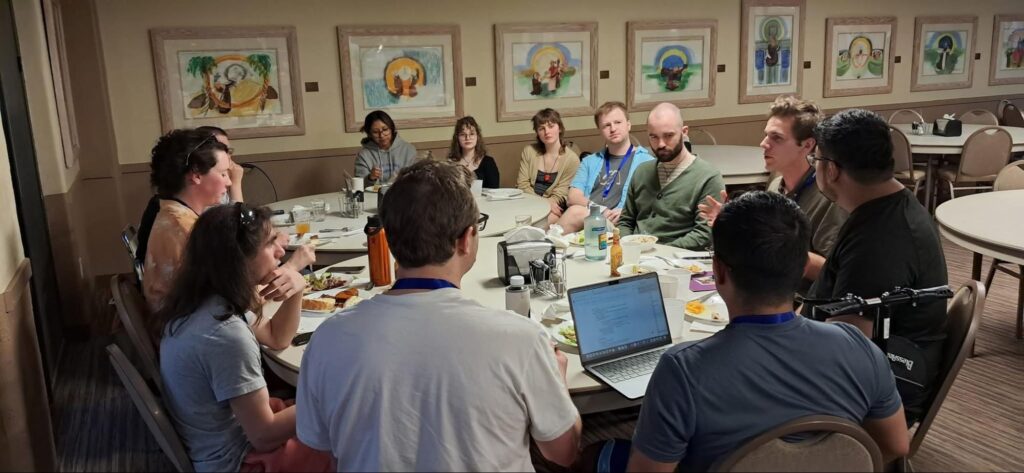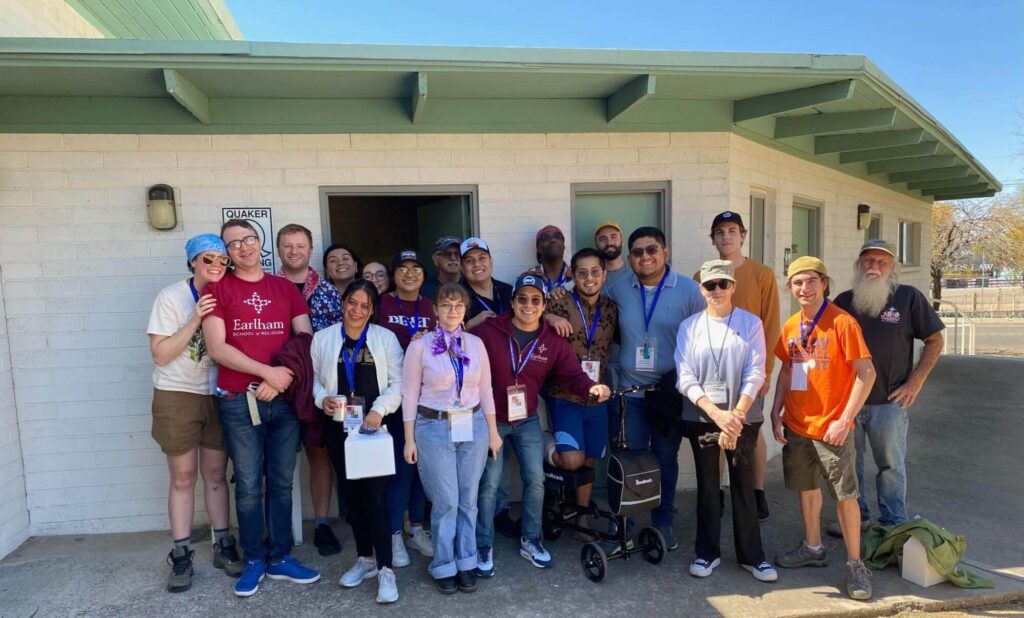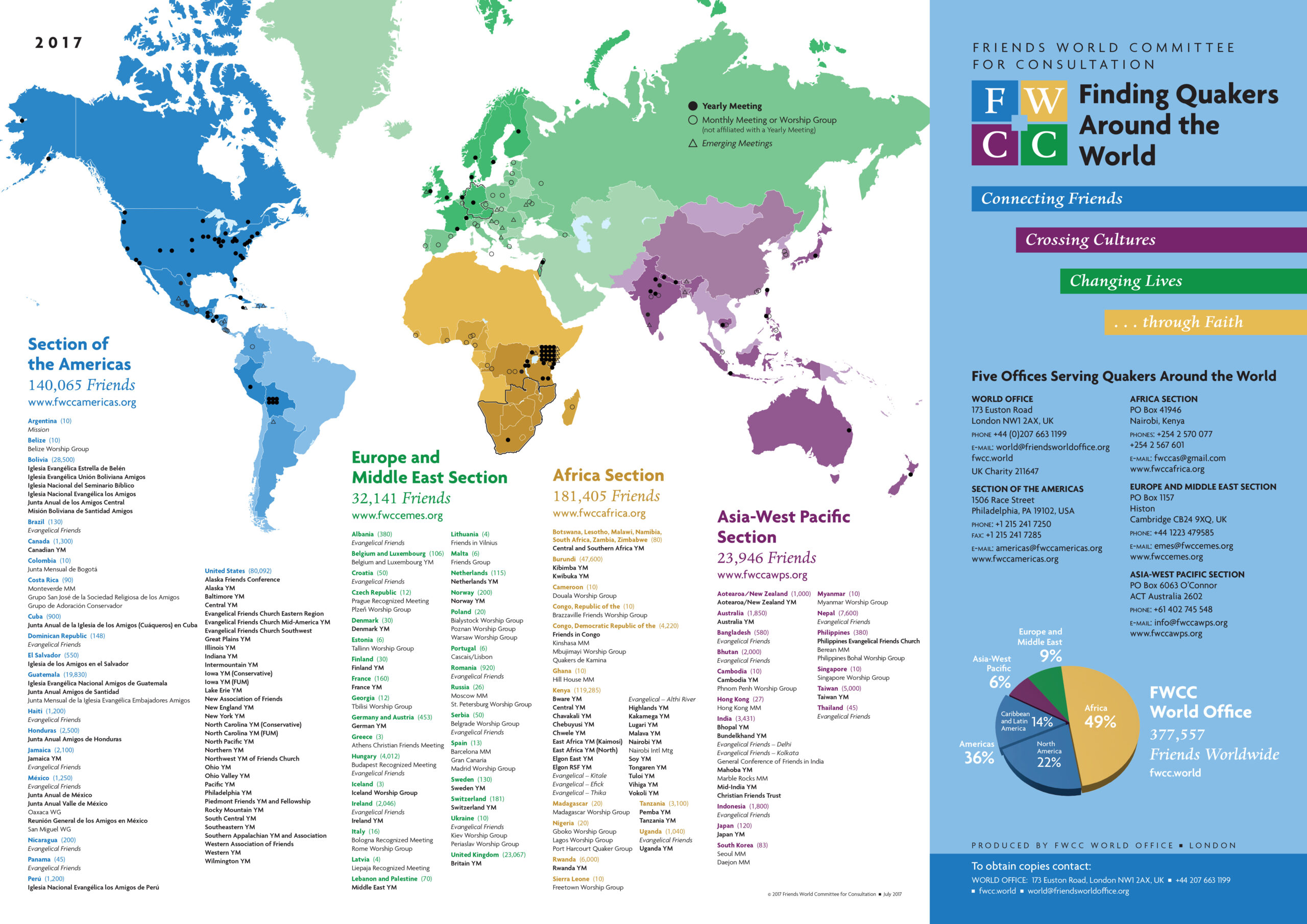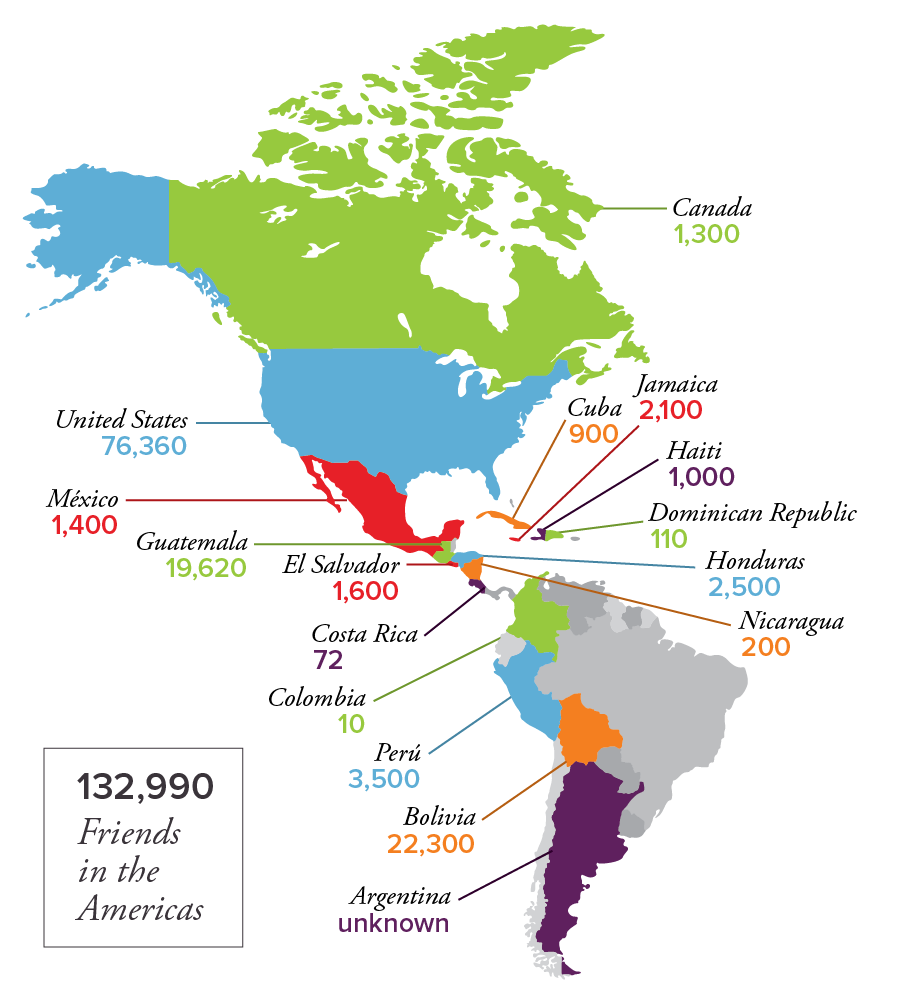On Friendship, and “Becoming the Quakers the World Needs”
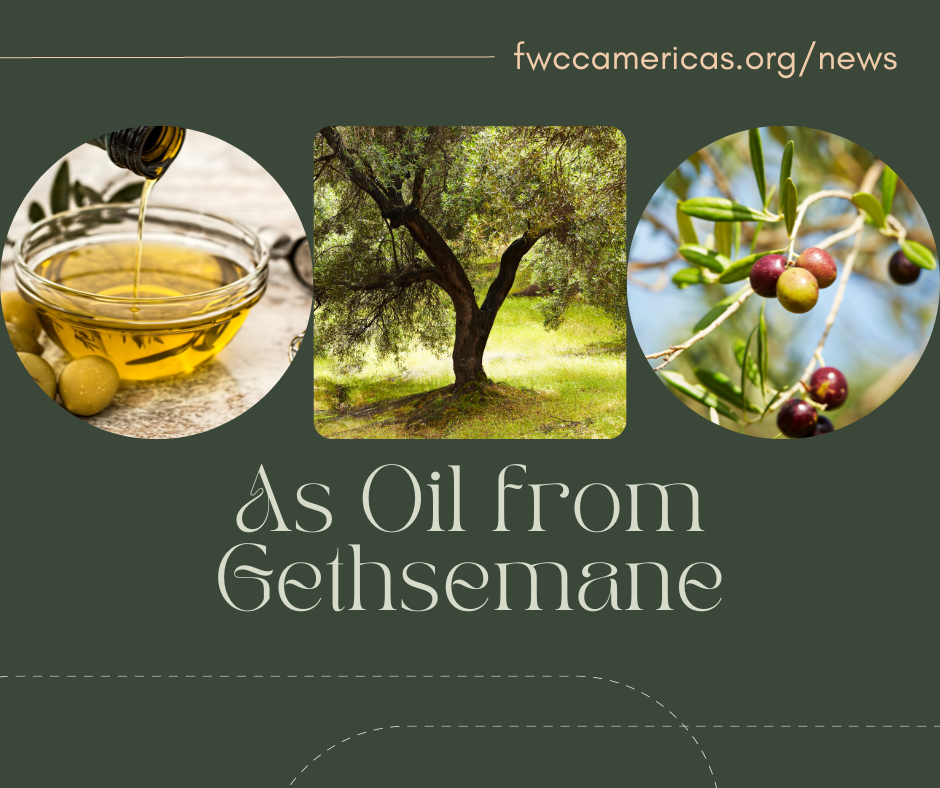
Good evening, Friends.
Just after I was born, I am told, my mother brought me to my first meeting for worship. She used to say that I had attended many before that, while she was carrying me in her womb, before I was born. I remember glimpses of those early years—mostly in images and sensations. But most of all, I remember the sense of coming home that met me in that worship, one that has continued to meet me throughout my life, a sense of spiritual intimacy, belonging, and relationship that has never left me, no matter the storms and struggles that might come. Thank you, Mom, for so many gifts. Thank you for the gift of bringing me home to Friends.
Many of you may know that my mother passed away suddenly and unexpectedly on Thursday, just after I had arrived to join those gathered in North Carolina. I am deeply sorry not to be able to be with all of you who are gathered there this week, but I am grateful to be with my family in this time of grief, and for this opportunity to be together with you and our wider community of Friends around the world tonight. And
I am deeply thankful for the many expressions of care, support, condolence, and prayer shared by so many of you in the hours since then. On behalf of our family, thank you.
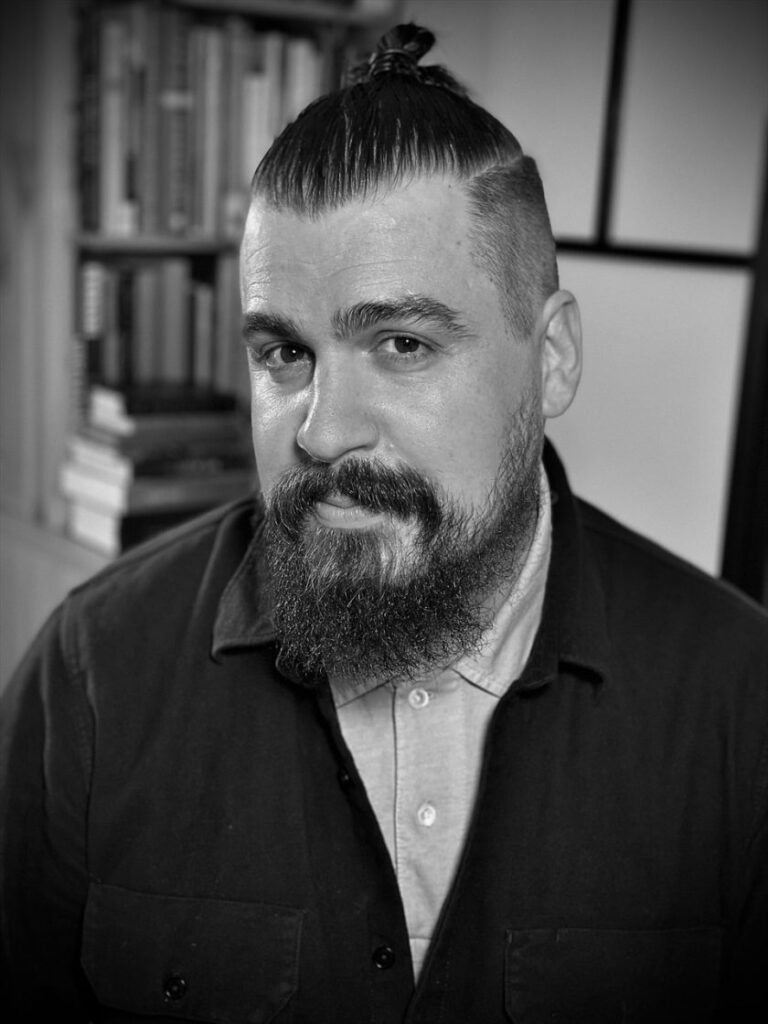
The connections so many of us are experiencing as part of this Section Meeting are difficult or impossible to make in any other ways, anywhere else in the world. And in these times of division, distrust, and grief, tending to and strengthening loving relationships among us as the People of God called Friends has never been more important.
Across the Americas, we who are gathering have lost neighbors, loved ones, dear Friends. Many Friends faith communities—and the wider communities in which we live, work, and serve—have been devastated, whether by the immediate loss of health and life from illness, or by related losses: economic instability, deprivation, and collapse, restrictions on travel, disruptions of access to basic needs, or the social atrophy that has left many of us lonely, fragmented, unsure of what the future holds. Some of us find ourselves restless and unsatisfied, even in relative comfort.
From the Arctic to the Andes, recent years have brought political polarization, instability, and strife. There is growing suffering and insecurity, worsened by climate chaos. In many of our societies, bonds of civil discourse and relationship, already tenuous, have eroded further— sometimes seeming to unravel entirely. In many places, there is ebbing faith in institutions to save us. Ideologies—no matter how loudly or passionately proclaimed—no longer hold the reassuring or motivating power they once did for many. In the cultures around us, there is increased loneliness and fear.
Truly, this is an in-between time; a threshold between worlds. The signs are all around us. Things will not return to the way they were. The rhythms of communal life, the stable approaches of our Friends institutions—our local meetings and yearly meetings and wider fellowships like the Friends World Committee—don’t seem to be working in the ways we’ve come to trust. And yet, amidst all that is changing, it is difficult to imagine the future yet to come.
Our theme for this gathering is, “Becoming the Quakers the World Needs.” When I was invited to share with you tonight with this focus, I wrestled in prayer with the invitation. The theme seemed to suggest some significant things about which I was not sure I had much to offer. Trusting the discernment of the organizers, I knew there was something more to be discovered here. So I listened, in patience, and in prayer for what I might be given.
The first thing that the theme seems to suggest is that the world needs something, and that we—here, together—might be able to discover what that something is. It also seems to imply that this something might have to do with us—as people living our faith in these times rooted in the tradition and testimony of the Religious Society of Friends.
The second suggestion is that we are not now—perhaps we aren’t anymore, if we ever were, or perhaps we are not yet—who we need to be in some sense, in order to help the world receive this something.
And the third—perhaps most significant of all—is that there might be some way that we —us here together, gathered in person and across the miles—might participate in a process of becoming that will allow us to respond in a meaningful sense to the needs of the world, in these times we have been given.
So tonight I want to invite you to come with me in an exploration of our theme. I want to share some stories from our living tradition. And I hope, in this brief time, that we will find a fresh reminder of the invitation to a shared journey together as a People being gathered into covenant with God and one another.
—
The first story I’d like to share is about that something that the world needs. It begins, as so many things in my experience of the work of the Section of the Americas, with an unexpected text message.
My dear Friend Myron Guachalla and I have known each other for several years through the work of the Friends World Committee. Last year, unexpectedly, Myron sent me a message. As part of his service helping prepare for the World Plenary next year and his service on the Central Executive Committee, he was flying back from Nairobi to Bolivia, and had been able to arrange a stopover in Boston. Given how close he would be to my home a few hours away in Vermont, he asked, could we meet?
On the day he was scheduled to fly home, Myron and I met in Boston. We found a park near the harbor, the site of an old maritime fortress that has been destroyed and rebuilt many times over. The place had been used, in the earliest days of European colonization in the region I call home, to house Indigenous prisoners of war before they were sold into slavery. From the fortress island, a bridge led to a long breakwater arcing out into the water, toward the harbor islands, and beyond that, to the endless ocean. Afterwards, we agreed, I would drive him to the airport for his journey home.
We walked together along that breakwater, surrounded by wind and water, in a place between sea and land and sky, in a place in time between arrival and departure, between the tragedies and diversity of our shared history in this hemisphere on one side, and a future beyond knowing on the other. In the midst of our journeys, we walked together in a time set apart.
And as we walked, we reflected on these years since we’d last been together in person. We shared our stories. We spoke about our illnesses with COVID, about the struggles, griefs, and joys of Friends in our local contexts. How our walk with God had unfolded, our learning to pray and listen for God’s guidance. And we spoke about our sense of the condition of the body of Friends, and the condition of our world. We asked each other, as our theme seems to be asking, “What does the world need now?” and
“What are we able to offer, as Friends?”
I remember Myron’s clarity reflecting on a conversation he’d had the evening before with some people he’d met in the city, who had been inspired by their own encounters with the Quaker movement, and the many good works in which Friends locally were engaged, past and present.
There is so much work that needs to be done, he said, important work in which Friends may be led to be involved, so much that Quaker individuals and organizations are already doing—social action, service and presence and witness, living with integrity in our lives and livelihoods, reaching for a more just and inclusive world.
And yet maybe, he said, what is needed now isn’t just urgent action, more advocacy and lobbying and training and demonstrating, more proposals, petitions, and programs. Maybe what the world needs is not just our actions. Maybe it’s not our works, however fruitful and significant or strategic they may be. Maybe what the world needs, he said, is what inspires these things. Myron’s words resonated deeply in me, and have ever since. Maybe the World needs not the fruits of our faith, but the Root of it. What the world needs is the Source of our Hope.
Maybe you’re like me. At times in these years, that Hope has felt far off. I’ve wrestled with disillusionment. In service in institutional leadership on behalf of Friends communities in the northeastern United States, in gospel ministry, and in my relationships with Friends and neighbors in the places in which I live and work and serve, the separation and relentless strain of these years have worn me down. I’ve grown numb. I’ve struggled to pray, and God’s voice, so full of assurance at times, has grown quiet. In seeking to accompany Friends as we’ve navigated the storms of these years, I’ve been brought to a reckoning with a difficult truth. For many Friends communities, particularly in my experience in parts of the United States, the spiritual grounding that has knit our faith communities together has been revealed as fragile and brittle. In many places, our shared understanding of the guidance of what our tradition has to offer—has not been resilient enough to encompass the suffering, anxiety, disconnection, and disillusionment of these times. I confess that the roots of my faith have not been deep enough. I share in the broken-heartedness for where the roots of our faith have not been deep enough. And I know I’m not the only one who has come to this painful realization. Many of us, and many of our meeting communities, have lost something.
And yet, I know from experience that it is in the driest of times that our roots learn to reach more deeply to seek the Living Water, more deeply than they ever have before.
And so preparing for this time together, I’ve been praying, and listening for guidance for how I—and we—might rediscover that Hope.
Often, when I don’t know where to turn, I go back to the beginning.
I believe in beginnings. There is a power, I have found, in returning to how things got started, and in seeking to understand what lessons those beginnings might still have to teach us.
However painful or mysterious, we need to try to understand our beginnings. There is an Arabic proverb: When we have no past, we have no future. Rufus Jones, the 20th century North American Quaker who did so much to establish what would become the Friends World Committee, warned that absent a living relationship with the Spirit that animated our beginnings, we would soon become like cut flowers—beautiful now for a moment, but in some sense already dead.
I believe that the path to rediscovering and reclaiming our Hope runs back to our beginnings as a church, as a Religious Society.
So: what might our beginnings have to teach us about what the world needs, and about a process of becoming that helps this something to come more fully into the world today?
Most of us have heard the words George Fox used to describe his convincement, from his Journal. Words which have, for generations, formed our understanding of the discovery that birthed the Quaker movement. He wrote,
For these first Quakers, the life-giving joy of discovering that human beings could directly experience the inward voice of this Living Christ reoriented their lives, and kindled a movement. And alongside this, the promise that, not only could we hear this guiding voice and experience this liberating power individually, but that, as each of us yielded to it in our own hearts, we would experience it together. Francis Howgill writes of one of these early experiences of being drawn in to covenant community:
But here’s the part we quote less often, which follows immediately:
Here’s what I hope we might hear in this: The discovery of early Friends was a discovery of communion with a personal Presence. Coming to know and welcome this Presence, and allowing it to find a home in us, gives birth to a relationship—this is not something that is built, it is something that is given. A covenantal relationship which we must always choose, but for which we are chosen first.
This is founded on vulnerability, born of despair of the world and its power. As George Fox recounts his life-changing insight, the world doesn’t need us to save it. The world needs a living testimony to the Love that alone can save us from ourselves.
In these times, in the society in which I live, this is an unpopular message. In some circles, it’s even taken as theological malpractice, because of the ways this teaching has been used, especially for many of us who know the wounds of exclusion and marginalization, as justification to diminish our God-given capacities, to tear us down or beat us up. And yet, there is no avoiding it, if we take the testimony of our spiritual ancestors and the elders amongst us seriously. Quakerism is a path of descent, and not of personal triumph. We are invited to yield, to surrender all that we are, trusting that we will find on the other side the journey home, a fullness of life beyond what we could have demanded or created or
imagined.
This discovery was an essential part of our beginning. And yet, times as dry as these draw our roots deeper. Because of course, our journey as Friends didn’t begin in the 1650s. Our name came from somewhere. There’s a reason we call ourselves Friends. And this “Friendship”, I believe, has everything to do with the source of our Hope, and how it might be shared. It has everything to do with this becoming.
Given its essential significance in our own tradition, the name we use to greet one another and to describe our movement across the Americas and globally, it seems important to pay attention to the context of how Jesus came to call us “Friends.” It began over dinner one night, in an upper room in Jerusalem, two thousand years ago.
The Gospel of John relates that after they had shared the evening meal, Jesus offered what would be his final message to the disciples before his crucifixion. It was in this last teaching, when he knew that the hour was drawing near when he would be betrayed, arrested, tortured, and executed, that he said these words:
So: Jesus has told them “everything”. And yet, the gospel narratives don’t seem to have understood this.
The next acts taken by the disciples described in the biblical narrative are 1) to fall asleep, 2) to betray Jesus to his persecutors, 3) to attempt murder to prevent Jesus from being arrested, in disobedience of Jesus’ instructions, and 4) to abandon Jesus, which all of them did, except some few faithful women. None of the men. Through all of this, they protested that they would never do these things, even as they did them. And they demonstrated, again and again, that they did not know everything, that they did not understand.
So I want to address the elephant in the room, the obvious issue here. According to our understanding of it now, of course, what Jesus says is not true. The disciples did not fully know, they did not understand the fullness of what was to come.
This is obvious from the narrative. It was only later, looking back through the profound reorientation of their hearts—and of Creation—begun in the Resurrection. And this understanding in light of the Resurrection is the voice that narrates the Gospels. When they were first called Friends, they did not understand what was to come.
And yet, the writers of the Gospels chose to explicitly include the disciples’ lack of understanding of “what the master was doing” when they wrote the story later—so the fact that they did not yet understand, when Jesus called them Friends, must have been important to the writers of the Gospel narrative. Here, in the beginning, is a message that could also be important for us.
Rather than giving the disciples a guidebook, a project plan, a set of principles or a set of goals to be achieved through their own strength and striving, Jesus called them into a Friendship.
We do not walk alone. We are given to one another, gathered into fellowships journeying together as a People born, nourished, and sustained by communion with this Presence, this Friend. And this One is waiting to speak—if we are willing—into our condition now, just as this same Friend reached George Fox in his desperation, yearning, and despair—and just as this same Spirit reached Myron and me that day on the pier.
So: Becoming the Quakers the world needs.
A great blessing of my life has been to be taught and inspired by the faith and witness of Cuban Friends, relationships that have been kindled through the Bridge of Love between Friends in our yearly meetings in Cuba and New England. While I mourn the continuing political callousness, inertia, and fear that prevents our being together in person, I am grateful to understand that some Friends from Cuba have been able to join us remotely during the activities of this week, and to know that some are with us online tonight. One of the people who has been an encouragement and an anchor for me in times of struggle and doubt is my Friend William.
William and I are close to the same age, and in our opportunities together over the years we have recognized in each other kindred spirits, resonant calls from the Lord to encourage and build up our covenant people in each of our contexts, as part of the wider body of Friends in the times we have been given.
Years ago, Robin Mohr and I traveled in the ministry to La Paz to participate in the training for Latin American Friends serving as part of the Traveling Ministry Corps. We were joined by Friends from Central and South America and the Caribbean, including William, who traveled from Cuba to participate.
Late one night while we were there, William and I were walking in the streets of the city. Out of the stillness, William shared that he was carrying a message from the Lord that he knew I also needed to hear. This was the message: “It’s time to gather those who are willing to go with the Lord to Gethsemane”.
A few words now about Gethsemane, so we’re all on the same page. Gethsemane is the name of a place just outside the city of Jerusalem in the New Testament. On what is called the Mount of Olives. It’s described as a garden of olive trees. The place appears in some form in each of the four gospels as the place Jesus goes with the disciples just before his arrest.
Taken together, these accounts make clear that the location of Gethsemane, and what happens there, play a pivotal role in the gospel narrative as a whole. So: what happens in Gethsemane?
I’d like to pause here for a moment to talk about olive trees and the fruits they bear.
Olive trees grow and thrive in dry places, under conditions of hardship in which other trees would wither. Their trunks are thick and twisted. Olive trees grow through endurance and steadfastness, in the exhausting heat, through the winds and storms of winter. Even when their trunks are cut to the ground, they can grow back. They can live for a really long time. Olive trees can seem to take forever to bear fruit—but the fruit will come. They are a symbol of steadfastness and resilience, even in these terrible times in the lands where Jesus was born.
The fruits of the olive tree- Olives- only grow on new growth, so pruning is necessary after each harvest. It’s only after loss and hardship that the new life comes. They must remain on the tree to ripen before being picked; separated from the body from which they have grown, they will not mature.
Great quantities of olives are pressed together under enormous weight to yield their oil, with countless uses: to heal and sustain life, to bring light, to preserve beauty, to nourish bodies, to cleanse and anoint and baptize the living and the dead.
In households around the world, olive oil is common, ever present at our table—the place of hospitality where we are welcomed, nourished in relationships, and fed.
In the language Jesus spoke, the place where olives are pressed has a name. You may remember it from before: That name is Gethsemane.
So back to the story:
Immediately after the last supper—right after he first calls the disciples “Friends”—Jesus walks out the door, into the night, to Gethsemane. And the disciples follow him.
In the garden, Jesus asks a few of them to pray—that they might sustain their attention on God, and not fall into temptation. Moving a short distance further off, but still where they can keep him in their sight, he begins to pray. The prayers Jesus prays, here in Gethsemane, bring us to the heart of the spiritual journey, to the depths of suffering and the human condition, and to the Way into which God invites us.
Knowing all that was to come, Jesus bared his heart in vulnerability. Pouring out his spirit to the Lord in prayer in the bitter watches of the night, tears falling like drops of blood on the broken ground, Jesus offered a living example of the ultimate surrender to love, of surrender for love, even and especially when that surrender, that willingness rose from the abyss of despair, disillusionment, violence, and death. As he prepared to lay down his life to reveal the world’s captivity to violence, and to offer the world an invitation to liberation and joy beyond imagination, he set an example of willingness for the disciples to follow. “If it is possible—Abba, Father—let this cup pass from me. And yet, not my will, but thy will be done.”
And in response, the ones he had just called to be his Friends fell asleep. In the hours and days to come, they disobeyed him, betrayed him, and abandoned him. To make this clear: they did not just happen to be distracted. They were not just insufficiently devoted to their spiritual exercises. The first Friends in the garden of Gethsemane were traitors.
When the soldiers came to arrest Jesus, the disciples fled. They abandoned him, denied him and disobeyed his instructions. And Jesus knew it would happen, told them it would happen, and loved and forgave them anyway. Through the wrenching violence of his arrest, torture, and crucifixion. Through the lonely desperation of absence, terror, and death. And through the amazement and joy of his return to them, bearing in himself the forgiveness and unshakeable love they had been offered all along.
For generations, Friends have read the Scriptures with an understanding that the events described do not only speak to historical events, they also give language for our present experience in our journey with God. And so for us tonight Gethsemane is a real place, a place in this story from our past, and—if we allow it—it is also a spiritual place, a condition of the heart.
Gethsemane is a place in-between—between the tragedies and failings of our past and the mystery of our future made possible by joy. Being willing to go to Gethsemane is welcoming vulnerability and brokenheartedness, and finding within it that we are standing on unshakeable ground, not because there will not be death, disillusionment and grief—there will be! And yet, we may abandon, but we will never be abandoned.
This place is always available to us in worship, where we can wait and watch with our eyes on the Teacher. There, we can be certain that as those first Friends did in the garden, we will fall asleep, that we will get distracted, that we will find ourselves having abandoned, in our fear and striving and confusion, even our most heartfelt aspirations and commitments to a life in faith.
And, in every moment, the garden of Gethsemane waits for us again, a memory that we are called to be Friends by the One who loved us first. We are invited on this journey by the One who knew that we could not understand fully yet, and who invites us for who we are now, and for who, in this shared fellowship, we might discover ourselves as becoming.
Beyond Gethsemane, as the sun puts the shadows to flight, there is the world. And it is for the world—which always includes us, but is not limited to us—that we are called, gathered, and sent. Ultimately, Gethsemane is a birthplace, a womb from which God is giving birth to a New Creation.
We live in a Gethsemane time. So much of the striving of the 20th and the first years of the 21st century, the hubris of ideology and pride and selfishness, is giving way to exhaustion and hopelessness and distraction. We and so many of the people around us are tired, burdened, borne down by the weight of suffering, the exhaustion of our human failings and dreams unfulfilled. In so many ways, we’re returning to the same realization as those early Friends. We are recognizing that we cannot save ourselves.
Rufus Jones knew about this essential experience of disillusionment and unknowing as a foundation of spiritual resilience. He wrote, “If you have not clung to a broken piece of your old ship in the dark night of the soul, your faith may not have the sustaining power to carry you through to the end of the journey.” And this condition of the heart is what we discover in Gethsemane.
We are like olives. The Religious Society of Friends is like an olive tree, and the fruits of the Spirit born from lives lived in this Friendship, are like the olive oil pressed from our willing hearts. And so, let us go to Gethsemane, the place where the olives are pressed.
To go with the Lord to Gethsemane is to stand at the threshold, though our bodies may quake, with eyes and ears and hands and hearts wide open to the stirrings, the springtime of this new world. This Hope reaches out, not just to move through policies and programs, through social movements and economic choices, through social services and schools and feeding programs, but to reach and forgive and free even the secret desires of the heart. “For the Creation waits with eager longing for the revealing of the children of God.”
We cannot yet know what is within us—as the disciples did not know, when they went to the garden with their Friend, what oil of love and forgiveness their lives would bear.
But there is one thing needful: the willingness to go together to the oil press. No one ever pressed a solitary olive. This is not about being saved as separate, about our own individual spiritual journeys and fulfillment. It’s about being part of the Friendship through which God’s anointing continues to come into the world. The Good News is not that we are great or special or holy. It’s that we are a fellowship of forgiven traitors, a society becoming Friends.
So, who are the Quakers the world needs?
The Quakers the world needs are those who are willing to go with the Lord to Gethsemane. Vulnerability. Tenderness. Resilience. Humility. Abiding. Patience. Mystery. Presence.
The Quakers the world needs are human beings alive in Friendship, bearers in our living of a Hope that comes to us from the shores beyond the ocean of despair.
And once again, we are being invited to rediscover this Friendship that embraces the whole of our lives, as relevant in the pasture as in the protest line; on the factory floor and in the hospital, in the art studio and the marketplace, on the streets and in the wilderness, at the border and in the heartland, at the bedside of a dying loved one or a newborn stranger, in the halls of government as much as in the hearth and home.
There is no playbook, there is no recipe, no rigid doctrine or program for transformation; there are are no “ten easy steps”. We don’t know the specifics of what the end will look like, or the details of the plan. We aren’t given a “where”, a “what”, or a “when”. But there is a Who: There is a Presence, a Friend who can meet, shape, and guide us. And there is a How: There is a Way.
The Friendship that begins at the threshold of Gethsemane ends in amazement and joy. May we be given the courage to follow—that in each new and continuing birth of this humble power, the world might be cleansed, healed, anointed, through the oil of this Grace pressed from wounded and wandering hearts.
Very soon now, we will return in body, and in our minds and hearts, to our own homes and neighborhoods, to our own responsibilities. And what will be different? Where will we invest our attention, in the time we have been given?
As we turn again to each daily act of faithfulness, as we go together into the world anew, how will our lives make visible the Hope that inspires us? What fruits will be borne from this journey?
Where does this Friendship lead?
Friends: Come and see.
